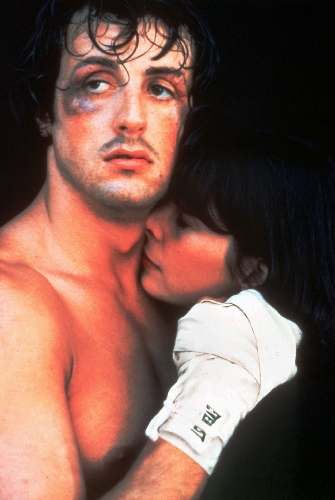‘Rocky”fills gaps,’ sets standard for inspirational flicks

NO. 1: “ROCKY” (1976) — In the immortal words of Rocky Balboa, this Academy Award winner for best picture “fills gaps” in the pantheon of exemplary sports movies and became the model upon which all inspirational imitators are based. Yo, Adrian: When they cue that powerful “Rocky” music, you’re gonna eat lightning and … well, you remember what his trainer, Mickey, said.
NO. 2: “FIELD OF DREAMS” (1989) — If you build it, guys in old flannel baseball uniforms might come walking out of an Iowa cornfield. One of them might be your deceased father. You might feel compelled to “have a catch” with him. And then, depending how you felt about your old man when he was alive, you might cry.
NO. 3: “SLAP SHOT” (1977) — Hey, Hanrahan! I am personally placing a $100 bounty on the head of Tim McCracken, the head coach and chief punk on that Syracuse team, and anybody else who doesn’t think this movie skates circles around every other one made about hockey. Yes, that includes “Miracle” starring Kurt Russell as coach Herb Brooks.
NO. 4: “INSIDE MOVES” (1980) — The plot centers on a handicapped guy named Roary, who got that way by trying to commit suicide by jumping off a tall building, and another handicapped guy named Jerry, who wants to try out for the Golden State Warriors. That’s not his handicap, that’s his dream. Sounds depressing, right? But Roary and Jerry hang out at this bar with a bunch of other handicapped guys whose zest for life is uplifting. Plus, Clifford Ray has a cameo.
NO. 5: “WE ARE MARSHALL” (2006) — If playing catch with your deceased father doesn’t make you cry, see if the scene where Marshall football players visit the resting place of their counterparts who perished in the 1970 plane crash and Matthew McConaughey (as Marshall coach Jack Lengyel) gives his emotional speech doesn’t have you reaching for Kleenex. The part where West Virginia coach Bobby Bowden puts little green crosses on the Mountaineers’ helmets to pay tribute to the Marshall victims also gets me every time.
NO. 6: “LE MANS” (1971) — The only dialogue in the first 36 minutes of this movie are the high-pitched wails of a Porsche 917 and a Ferrari 512. This is why racing people say this is the best movie ever made about their sport. Plus, it has Steve McQueen, who explains auto racing this way when the roar of the engines subsides: “A lot of people go through life doing things badly. Racing’s important to men who do it well. When you’re racing, it’s life. Anything that happens before or after is just waiting.”
NO. 7: “THE PRIDE OF THE YANKEES” (1942) — I know, as the doc told Gary Cooper, it’s three strikes. It’s always three strikes. But yet I plop this old black-and-white biopic into the equally old VCR on every Opening Day, if for no other reason to hear Lou Gehrig’s mom say “that Babe Ruth is pretty good, too.”
NO. 8: “HOOSIERS” (1986) — “Let’s win this game for all the small schools that never had a chance to get here.” But let’s win by six or seven so we don’t have to count on Ollie, the former student manager, coming off the end of the bench to sink another underhanded free throw.
NO. 9: “THE HURRICANE” (1999) — “Here comes the story of the Hurricane, the man the authorities came to blame. For somethin’ that he never done.” That’s how the chorus to Bob Dylan’s anthem to Rubin “Hurricane” Carter, the former middleweight contender framed for real-life murder, begins. It’s a great song, and this is a great movie, as are most that star Denzel Washington in a leading role.
NO. 10: “61*” (2001) — I became a Roger Maris fan because of Billy Crystal’s movie, which I think was intended to be a tribute to Crystal’s boyhood hero, Mickey Mantle. The best part are the baseball scenes, every one of which Crystal got right. I mean when Tom Candiotti, a real-life knuckleball pitcher, is hired to portray Hoyt Wilhelm, whose specialty was the knuckleball — then enters the game with his head slumped to one side, just like Wilhelm — one can almost smell the beer and hot dogs.
Las Vegas Review-Journal sports columnist Ron Kantowski can be reached at rkantowski@reviewjournal.com or 702-383-0352.